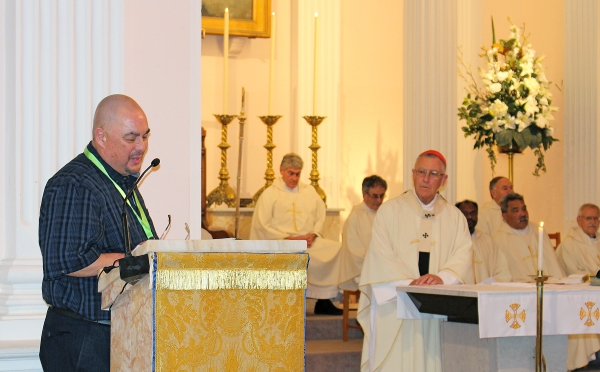by MARTIN de JONG
On the weekend of 15-17 September 2017, the Archdiocese of Wellington held its sixth synod, which was the second under Cardinal John Dew as Archbishop.
There was a sense that this could be a special kind of synod. Speaking before the gathering, leader of pastoral ministry for the archdiocese Mary-Ann Greaney welcomed the risk that Cardinal Dew had taken in “throwing it open” through a process of prayerful discernment. “So we’re not in a head space, but seeking what is going on in the heart, following the Holy Spirit and what the Spirit is saying to the people,” she said.
In the preceding months, parishes had been praying a synod prayer each Sunday. There had been consultation through discussions and written submissions, summarised in a synod member’s booklet for each of the 350 participants, themselves prayerfully selected from parishes and diocesan ministries.
From the 2006 synod theme, the archdiocese had been operating under the banner of “Salt and Light”. This year’s synod was more missionary and action-oriented: “Go, you are sent . . .”, mindful of Pope Francis’ challenge to reach out to the margins and peripheries of both Church and society. After a whakatau (welcome) and opening address from Cardinal John Dew on the Friday night, the archdiocese’s Young Church Ministries showed a two-minute video of young people sharing their dream for the church in Wellington. This included comments such as:
“. . . for everyone to be real into it, and everybody to look out for each other and everyone to believe that God is really there caring for them.”
“. . . for everyone to follow Jesus, and not just pray for people rather than do the mahi [work] and go and help them.”
“. . . that it feels like a home for all young people”.
Ana Faatoi, community engagement coordinator for the Society of St Vincent de Paul, then shared her and other Vincentians’ experiences serving people in Wellington through the soup kitchen and in their homes.
“The peripheries is a place of familiarity to me,” she said, “It’s at the forefront of the peripheries that I came to understand what it means to serve Christ.” She didn’t have easy answers for difficulties expressed about going to the peripheries, beyond people’s comfort zones.
“There are no boundaries to how far you can go in serving your neighbours,” said Ms Faatoi, “the peripheries are always beyond our comfort zone.” They are also not far away . “It’s in the classrooms and playgrounds where we send our kids. It’s in our workplaces, or hidden in and around our neighbourhoods.” Just getting to know your neighbours is a big step, she said. “You’ll be surprised what you’ll learn about others, and yourself.”
Jonny Greaney, husband and father of young children in the Hutt Valley, said the welcome he and his family had received at new parishes and schools helped keep him involved the Church. “Our Pope is a wonderful sign of love in action, maybe we can be too,” he said, “Let our actions speak very loudly for us.”
On Saturday and Sunday, the synod followed a process of prayerful discernment in small groups of 10 people each, with a facilitator keeping people on topic and listening attentively to each other. Scribes for each group recorded conclusions and recommendations, which two analysts then distilled down to 12-13 key recommendations per topic. Project assistant for the archdiocese and key synod organiser Anne Dickinson said the analysts were looking for both convergence — many people and groups reflecting a common concern; as well as the “lone, prophetic voice” — a single statement from one person which may be speaking truth to the whole group.
Almost all spoken to by NZ Catholic praised the discernment process, the listening to all voices and the event management for running on time. In fact, the final report back on Sunday afternoon finished ahead of time, and a demand for the Mass to be brought forward half an hour couldn’t be met as some musicians were only arriving for the scheduled time.
Jude McKee from St Theresa’s parish, Plimmerton, described the process as “amazing”. “Each group came up with different things; they complemented each other,” she said. “I think people got brave in what they wanted to say. This was their chance. Even if it was a dream, a pipe dream . . . it made people think.”
Bernadette Masoe, a eucharistic minister who is also involved in a youth group at Upper Hutt, said it was eye-opening, made her value her Catholic Faith, and encouraged her: “We as young people are able to change the world.”
Cardinal Dew described it as a weekend of “fantastic participation” and was grateful for the generosity and input of the people. The appreciative discernment process had given much material to be reflected upon, then worked upon in the weekend.
He is now considering the 96 recommendations from the synod, and will promulgate them in their final form on a date yet to be announced. “Practical actions” which emerged from the workshops are being collated separately.
At the conclusion of the closing Mass, Cardinal Dew said “Please do not hesitate in putting some of these into practice now in your parishes”, as some could be implemented straight away. He then invited all present to join him as he and his clergy left the altar, saying “Go you are sent, you have a job to do”.

Blind leading the blind! Madness as there will be no unity in the liturgy everyone will be on their own inspirational agenda and it will be the Tower of Babel all over again. Who would want the headache of being a priest in the Wellington AD? Our Lord states “My ways are not yours and your ways are not Mine.”